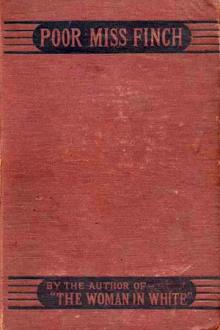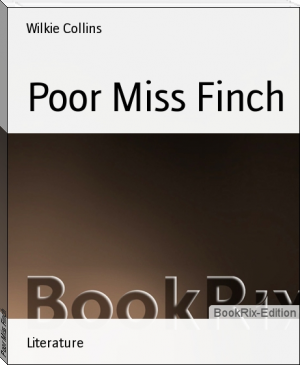Poor Miss Finch - Wilkie Collins (best books to read for beginners txt) 📗

- Author: Wilkie Collins
- Performer: -
Book online «Poor Miss Finch - Wilkie Collins (best books to read for beginners txt) 📗». Author Wilkie Collins
“You fiend!” he burst out, stepping close up to me with a look of fury.
The whole passionate fervour of the love that the miserable wretch felt for her, shook him from head to foot, as his horror of me found its way to expression in those two words.
“Spare me your opinion of my character,” I said. “I don’t expect you to understand the motives of an honest woman. For the last time, let me by!”
Instead of letting me by, he locked the door, and put the key in his pocket. That done, he pointed to the chair that I had left.
“Sit down,” he said, with a sudden sinking in his voice which implied a sudden change in his temper. “Let me have a minute to myself.”
I returned to my place. He took his own chair on the other side of the table, and covered his face with his hands. We waited awhile in silence. I looked at him, once or twice, as the minutes followed each other. The shaded lamp-light glistened dimly on something between his fingers. I rose softly, and stretched across the table to look closer. Tears! On my word of honor, tears forcing their way through his fingers, as he held them over his face! I had been on the point of speaking. I sat down again in silence.
“Say what you want of me. Tell me what you wish me to do.” Those were his first words. He spoke them without moving his hands; so quietly, so sadly, with such hopeless sorrow, such uncomplaining resignation in his voice, that I, who had entered that room, hating him, rose again, and went round to his chair. I—who a minute ago, if I had had the strength, would have struck him down on the floor at my feet—laid my hand on his shoulder, pitying him from the bottom of my heart. That is what women are! There is a specimen of their sense, firmness, and self-control!
“Be just, Nugent,” I said. “Be honorable. Be all that I once thought you. I want no more.”
He dropped his arms on the table: his head fell on them, and he burst into a fit of crying. It was so like his brother, that I could almost have fancied I, too, had mistaken one of them for the other. “Oscar over again,” I thought to myself, “on the first day when I spoke to him in this very room!”
“Come!” I said, when he was quieter. We shall end in understanding each other and respecting each other after all.”
He irritably shook my hand off his shoulder, and turned his face away from the light.
“Don’t talk of understanding me,” he said. “Your sympathy is for Oscar. He is the victim; he is the martyr; he has all your consideration and all your pity. I am a coward; I am a villain; I have no honor and no heart. Tread Me under foot like a reptile. My misery is only what I deserve! Compassion is thrown away—isn’t it?—on such a scoundrel as I am?”
I was sorely puzzled how to answer him. All that he had said against himself, I had thought of him in my own mind. And why not? He had behaved infamously—he was a fit object for righteous indignation. And yet—and yet—it is sometimes so very hard, however badly a man may have behaved, for women to hold out against forgiving him, when they know that a woman is at the bottom of it.
“Whatever I may have thought of you,” I said, “it is still in your power, Nugent, to win back my old regard for you.”
“Is it?” he answered scornfully. “I know better than that. You are not talking to Oscar now—you are talking to a man who has had some experience of women. I know how you all hold to your opinions because they are your opinions—without asking yourselves whether they are right or wrong. There are men who could understand me and pity me. No woman can do it. The best and cleverest among you don’t know what love is—as a man feels it. It isn’t the frenzy with You that it is with Us. It acknowledges restraints in a woman—it bursts through everything in a man. It robs him of his intelligence, his honor, his self-respect—it levels him with the brutes—it debases him into idiocy—it lashes him into madness. I tell you I am not accountable for my own actions. The kindest thing you could do for me would be to shut me up in a madhouse. The best thing I could do for myself would be to cut my throat.—Oh, yes! this is a shocking way of talking, isn’t it? I ought to struggle against it—as you say. I ought to summon my self-control. Ha! ha! ha! Here is a clever woman—here is an experienced woman. And yet—though she has seen me in Lucilla’s company hundreds of times—she has never once discovered the signs of a struggle in me! From the moment when I first saw that heavenly creature, it has been one long fight against myself, one infernal torment of shame and remorse; and this clever friend of mine has observed so little and knows so little, that she can only view my conduct in one light—it is the conduct of a coward and a villain!”
He got up, and took a turn in the room. I was—naturally, I think—a little irritated by his way of putting it. A man assuming to know more about love than a woman! Was there ever such a monstrous perversion of the truth as that? I appeal to the women!
“You ought to be the last person to blame me,” I said. “I had too high an opinion of you to suspect what was going on. I will never make the same mistake again—I promise you that!”
He came back, and stood still in front of me, looking me hard in the face.
“Do you really mean to say you saw nothing to set you thinking, on the day when I first met her?” he asked. “You were there in the room—didn’t you see that she struck me dumb? Did you notice nothing suspicious at a later time? When I was suffering martyrdom, if I only looked at her—was there nothing to be seen in me which told its own tale?”
“I noticed that you were never at your ease with her,” I replied. “But I liked you and trusted you—and I failed to understand it. That’s all.”
“Did you fail to understand everything that followed? Didn’t I speak to her father? Didn’t I try to hasten Oscar’s marriage?”
It was true. He had tried.
“When we first talked of his telling Lucilla of the discoloration of his face, did I not agree with you that he ought to put himself right with her, in his own interests?”
True again. Impossible to deny that he had sided with my view.
“When she all but found it out for herself, whose influence was used to make him own it? Mine! What did I do, when he tried to confess it, and failed to make her understand him? what did I do when she first committed the mistake of believing me to be the disfigured man?”
The audacity of that last question fairly took away my breath. “You cruelly helped to deceive her,” I answered indignantly. “You basely encouraged your brother in his fatal policy of silence.”
He looked at me with an angry amazement on his side which more than equaled the angry amazement on mine.
“So much for the delicate perception of a woman!” he exclaimed. “So much for the wonderful tact which is the peculiar gift of the sex! You can see no motive but a bad motive in my sacrificing myself for Oscar’s sake?”
I began to discern faintly that there might have been another than a bad motive for his conduct. But—well! I dare say I was wrong; I resented the tone he was taking with me; I would have owned I had made a mistake to anybody else in the world; I wouldn’t own it to him. There!
“Look back for one moment,” he resumed, in quieter and gentler tones. “See how hardly you have judged me! I seized the opportunity—I swear to you this is true—I seized the opportunity of making myself an object of horror to her, the moment I heard of the mistake that she had made. I felt in myself that I was growing less and less capable of avoiding her, and I caught at the chance of making her avoid me; I did that—and I did more! I entreated Oscar to let me leave Dimchurch. He appealed to me, in the name of our love for each other, to remain. I couldn’t resist him. Where do you see signs of the conduct of a scoundrel in all this? Would a scoundrel have betrayed himself to you a dozen times over—as I did in that talk of ours in the summer-house? I remember saying in so many words, I wished I had never come to Dimchurch. What reason but one could there be for my saying that? How is it that you never even asked me what I meant?”
“You forget,” I interposed, “that I had no opportunity of asking you. Lucilla interrupted us, and diverted my attention to other things. What do you mean by putting me on my defence in this way?” I went on, more and more irritated by the tone he was taking with me. “What right have you to judge my conduct?”
He looked at me with a kind of vacant surprise.
“Have I been judging your conduct?” he asked.
“Yes.”
“Perhaps I was thinking, if you had seen my infatuation in time you might have checked it in time. No!” he exclaimed, before I could answer him. “Nothing could have checked it—nothing will cure it but my death. Let us try to agree. I beg your pardon if I have offended you. I am willing to take a just view of your conduct. Will you take a just view of mine?”
I tried hard to take a just view. Though I resented his manner of speaking to me, I nevertheless secretly felt for him, as I have confessed. Still I could not forget that he had attempted to attract to himself Lucilla’s first look, on the day when she tried her sight—that he had personated his brother to Lucilla that very morning—that he had suffered his brother to go away heart-broken, a voluntary exile from all that he held dear. No! I could feel for him, but I could not take a just view of him. I sat down, and said nothing.
He returned to the question between us; treating me with the needful politeness, when he spoke next. For all that, he alarmed me, by what he now said, as he had not alarmed me yet.
“I repeat what I have already told you,” he proceeded. “I am no longer accountable for what I do. If I know anything of myself, I believe it will be useless to trust me in the future. While I am capable of speaking the truth, let me tell it. Whatever happens at a later time—remember this, I have honestly made a clean breast of it tonight.”
“Stop!” I cried. “I don’t understand your reckless way of talking. Every man is accountable for what he does.”
He checked me there by an impatient wave of his hand.
“Keep your opinion; I





Comments (0)